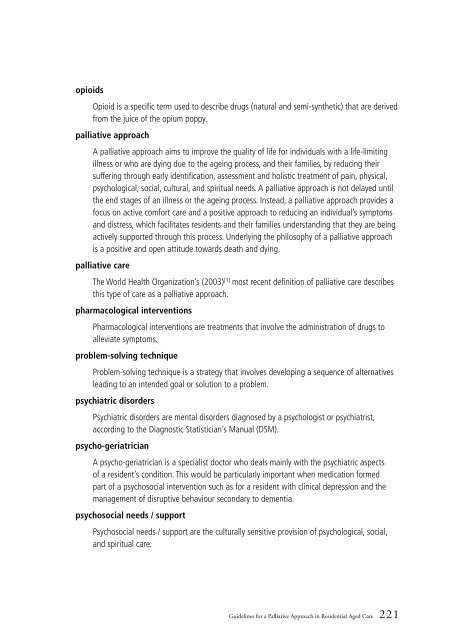Guidelines for a Palliative Approach in Residential Aged Care
Guidelines for a Palliative Approach in Residential Aged Care
Guidelines for a Palliative Approach in Residential Aged Care
Create successful ePaper yourself
Turn your PDF publications into a flip-book with our unique Google optimized e-Paper software.
opioids<br />
Opioid is a specific term used to describe drugs (natural and semi-synthetic) that are derived<br />
from the juice of the opium poppy.<br />
palliative approach<br />
A palliative approach aims to improve the quality of life <strong>for</strong> <strong>in</strong>dividuals with a life-limit<strong>in</strong>g<br />
illness or who are dy<strong>in</strong>g due to the age<strong>in</strong>g process, and their families, by reduc<strong>in</strong>g their<br />
suffer<strong>in</strong>g through early identification, assessment and holistic treatment of pa<strong>in</strong>, physical,<br />
psychological, social, cultural, and spiritual needs. A palliative approach is not delayed until<br />
the end stages of an illness or the age<strong>in</strong>g process. Instead, a palliative approach provides a<br />
focus on active com<strong>for</strong>t care and a positive approach to reduc<strong>in</strong>g an <strong>in</strong>dividual’s symptoms<br />
and distress, which facilitates residents and their families understand<strong>in</strong>g that they are be<strong>in</strong>g<br />
actively supported through this process. Underly<strong>in</strong>g the philosophy of a palliative approach<br />
is a positive and open attitude towards death and dy<strong>in</strong>g.<br />
palliative care<br />
The World Health Organization’s (2003) [1] most recent def<strong>in</strong>ition of palliative care describes<br />
this type of care as a palliative approach.<br />
pharmacological <strong>in</strong>terventions<br />
Pharmacological <strong>in</strong>terventions are treatments that <strong>in</strong>volve the adm<strong>in</strong>istration of drugs to<br />
alleviate symptoms.<br />
problem-solv<strong>in</strong>g technique<br />
Problem-solv<strong>in</strong>g technique is a strategy that <strong>in</strong>volves develop<strong>in</strong>g a sequence of alternatives<br />
lead<strong>in</strong>g to an <strong>in</strong>tended goal or solution to a problem.<br />
psychiatric disorders<br />
Psychiatric disorders are mental disorders diagnosed by a psychologist or psychiatrist,<br />
accord<strong>in</strong>g to the Diagnostic Statistician’s Manual (DSM).<br />
psycho-geriatrician<br />
A psycho-geriatrician is a specialist doctor who deals ma<strong>in</strong>ly with the psychiatric aspects<br />
of a resident’s condition. This would be particularly important when medication <strong>for</strong>med<br />
part of a psychosocial <strong>in</strong>tervention such as <strong>for</strong> a resident with cl<strong>in</strong>ical depression and the<br />
management of disruptive behaviour secondary to dementia.<br />
psychosocial needs / support<br />
Psychosocial needs / support are the culturally sensitive provision of psychological, social,<br />
and spiritual care.<br />
<strong>Guidel<strong>in</strong>es</strong> <strong>for</strong> a <strong>Palliative</strong> <strong>Approach</strong> <strong>in</strong> <strong>Residential</strong> <strong>Aged</strong> <strong>Care</strong> 221
















